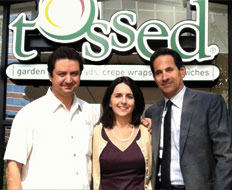Christi Hogin and her business partners Michael Jenkins and Chris Khaleghian opened their first Tossed unit in the heart of Los Angeles’ Financial District in March. Hogin and Jenkins, both lawyers, and Khaleghian, a former Johnny Rockets and Subway franchisee, built several sustainable elements into the salad store that not only reduce the carbon footprint of the unit, but also attract eco-conscious consumers.
Hogin shares her tips on “going green” and how this sustainable enterprise has developed both the brand and profitability.
1. Look for sustainable options all over your store
As a business owner, you constantly try to find money-saving opportunities. Sustainability provides the same issue; you can always find new ways to reduce costs and run a green restaurant. Being that our brand specializes in salads, we go through a lot of bowls, and one thing initially that we wanted to do was not be wasteful in offering our product. Our bowls are made by a California company, Bottle Box, which makes them from three recycled plastic bottles.
Another avenue for our environmental enterprise is in the form of our chairs in the dining area. Emeco, located in Pennsylvania, manufactures our chairs for the customers. Collaborating with Coca-Cola, they make each chair out of 111 20-ounce recycled Coca-Cola bottles. In fact, if you turn them over, you’ll find the Coca-Cola name on the bottom.
Part of the idea we had was to offer a healthy, fresh take on quick service, but also make that experience carry over into the surrounding dine-in space. From cutlery to lighting fixtures, there are all sorts of options to have your customer be immersed in your sustainable goal, and it starts with the initial design. We’ve created a store that houses our green initiative through the products and surroundings, and collaborated with local and American companies to become economically friendly, as well.
2. Make decisions that compliment your product
With sustainable operations, small businesses are offered many opportunities to stay profitable, and the customer is that deciding factor. The customer wants to make the choice of not causing any adverse effects when it comes to their dollars and cents, and this drives them to the brand that can perform sustainability the best. The association of your sustainability enterprise keeps you accountable with your customer base.
Sustainable operations are only going to get easier. For instance, it was a very forward thought process of the Coca-Cola Company to collaborate with an established, America-based chair company. When the company started the process, it wasn’t even sure that the material would withstand the weight of a person and stay functional over time. Coca-Cola figured out a way to stay accountable with its potentially wasteful product.
More innovation like this will make it easier for small-business owners and franchisees. These environmentally friendly operations and products are just another choice in the open market of factors to consider when making decisions for your business. Opportunities for all products are out there; our napkins are not only made out of 100 percent recycled paper, but also use soy-based ink, which decomposes better. You have to filter through the options and find what works for your product.
3. Remember that savings can be long term
Operations usually have one giant filter: cost. With sustainable operations, cost has to be looked at long term. As an example, our restrooms use low-flow toilet systems that traditionally cost more than standard fixtures, but will save money when it comes to our utilities. More often than not, when you find these vendors, they’re more specific to small businesses, such as franchisees, and are looking into sustainable options.
There can also be savings in the initial phases of the operation. Our goal was to provide sustainable practices, but also provide an economical boost. By working and collaborating with companies that are located in the state, as is the case with our bowl providers and store designers, we can better deal with those companies in terms of cost. They’re also on board with our idea and overall goal. It’s a partnership that promotes sustainable, environmental, and economical factors. This in turn helps local vendors and gets the customers attached to our brand because of who we choose to partner ourselves with.
4. Use sustainability as an excuse to be in the community
Our green enterprise has helped us to market without spending a lot of time or money. The product you offer and whom you choose to work with will bring the customers in right away, if you’re doing it correctly. Our initiatives, however, have given us the opportunity to be in the community and not lose on operations as a result.
May marked Tossed’s fifth annual Salad Contest to celebrate National Salad Month. This contest allows anyone to submit his or her most original salad creation. We wanted to take the concept even further. We partnered with Los Angeles Unified Preschool, created to give all five-year-old children an opportunity to attend preschool. Through this partnership, we worked with the staff to create a healthy, kid-friendly salad. We’re learning what the customer wants to see in our products, and as a result, they turn around and tell others about our brand. Meanwhile, 50 cents from each sale of this particular salad goes directly back to the organization.
Because of the healthy, sustainable operations, we can have a symbiotic relationship and further our brand as a result.












